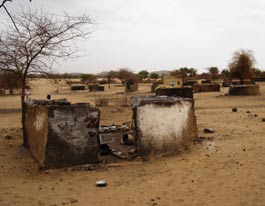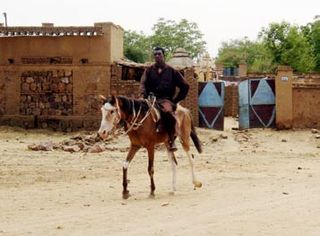China is one of the members of the United Nations and is one of five permanent members of its Security Council. One of the victorious Allies of World War II, the Republic of China (ROC) joined the UN as one of its founding member countries in 1945. The subsequent resumption of the Chinese Civil War between the government of Republic of China and the rebel forces of the Chinese Communist Party, led to the latter's victory on the mainland and the establishment of the People's Republic of China (PRC) in 1949. Nearly all of mainland China was soon under its control and the ROC government retreated to the island of Taiwan.

United Nations Security Council Resolution 1564, adopted on 18 September 2004, after recalling resolutions 1502 (2003), 1547 (2004) and 1556 (2004), the Council threatened the imposition of sanctions against Sudan if it failed to comply with its obligations on Darfur, and an international inquiry was established to investigate violations of human rights in the region.
An arms embargo is a restriction or a set of sanctions that applies either solely to weaponry or also to "dual-use technology." An arms embargo may serve one or more purposes:

While there is a consensus in the international community that ethnic groups have been targeted in Darfur and that crimes against humanity have therefore occurred, there has been debate in some quarters about whether genocide has taken place there. In May 2006, the International Commission of Inquiry on Darfur organized by United Nations "concluded that the Government of the Sudan has not pursued a policy of genocide ... [though] international offences such as the crimes against humanity and war crimes that have been committed in Darfur may be more serious and heinous than genocide." Eric Reeves, a researcher and frequent commentator on Darfur, has questioned the methodology of the commission's report.

United Nations Security Council Resolution 1672, adopted on April 25, 2006, after recalling resolutions 1556 (2004), 1591 (2005), 1651 (2005) and 1665 (2006) on the situation in Sudan, the Council imposed travel and financial sanctions on four Sudanese individuals over their involvement in the Darfur conflict. It was the first time sanctions had been adopted against individuals in the region.

United Nations Security Council resolution 1591, adopted on 29 March 2005, after recalling resolutions 1547 (2004), 1556 (2004), 1564 (2004), 1574 (2004), 1585 (2005), 1588 (2005) and 1590 (2005) on the situation in Sudan, the council placed a travel ban and asset freeze on those "impeding the peace process" in Darfur.

The African Union-United Nations Hybrid Operation in Darfur was a joint African Union (AU) and United Nations (UN) peacekeeping mission formally approved by United Nations Security Council Resolution 1769 on 31 July 2007, to bring stability to the war-torn Darfur region of Sudan while peace talks on a final settlement continue.

United Nations Security Council resolution 1054, adopted on 26 April 1996, after reaffirming Resolution 1044 (1996) concerning the assassination attempt on Egyptian President Hosni Mubarak at an Organisation of African Unity (OAU) summit in the Ethiopian capital Addis Ababa on 26 June 1995, the Council placed sanctions on the Government of Sudan after its failure to comply with OAU requests to extradite suspects sheltered in the country to Ethiopia.

United Nations Security Council resolution 1070, adopted on 16 August 1996, after reaffirming resolutions 1044 (1996) and 1054 (1996) concerning the assassination attempt on Egyptian President Hosni Mubarak at an Organisation of African Unity (OAU) summit in the Ethiopian capital Addis Ababa on 26 June 1995 and subsequent sanctions, the Council placed aviation sanctions on the Government of Sudan after its failure to comply with OAU requests to extradite suspects sheltered in the country to Ethiopia.

United Nations Security Council Resolution 1919, adopted unanimously on April 29, 2010, after recalling resolutions 1674 (2006), 1894 (2009) on the protection of civilians in armed conflict, 1612 (2005) and 1882 (2009) on children in armed conflict, 1502 (2003) on the protection of humanitarian and United Nations personnel, and 1325 (2000), 1820 (2008), 1888 (2009), and 1889 (2009) on women, peace, and security, the Council extended the mandate of the United Nations Mission in Sudan (UNMIS) until April 30, 2011 with the intention of renewing it further if necessary.

United Nations Security Council resolution 1372, adopted on 28 September 2001, after recalling resolutions 1044 (1996), 1054 (1996) and 1070 (1996) concerning the assassination attempt on Egyptian President Hosni Mubarak at an Organisation of African Unity (OAU) summit in the Ethiopian capital Addis Ababa on 26 June 1995 and subsequent measures, the Council noted compliance by Sudan and terminated sanctions against the country.

United Nations Security Council Resolution 1945, adopted on October 14, 2010, after recalling previous resolutions on the situation in Sudan, the Council extended the mandate of an expert panel monitoring an arms embargo and other sanctions on groups that "impede peace in Sudan" until October 19, 2011.

United Nations Security Council Resolution 1980, adopted unanimously on April 28, 2011, after recalling previous resolutions on the situation in Côte d'Ivoire, including resolutions 1880 (2009), 1893 (2009), 1911 (2010), 1933 (2010), 1946 (2010), 1962 (2010) and 1975 (2011), the Council extended an arms embargo, ban on the trade of diamonds and targeted financial and travel sanctions on Ivorian officials until April 30, 2012.

United Nations Security Council Resolution 1982, adopted unanimously on May 17, 2011, after recalling all previous resolutions on the situation in Sudan, the Council extended the mandate of an expert panel monitoring the arms embargo and other sanctions against the country until February 19, 2012.

United Nations Security Council Resolution 1651, adopted unanimously on 21 December 2005, after recalling previous resolutions on the situation in Sudan, particularly resolutions 1556 (2004) and 1591 (2005), the Council extended the mandate of an expert panel monitoring sanctions against and violations of human rights in the Darfur region until 29 March 2006. It was the last Security Council resolution adopted in 2005.

United Nations Security Council Resolution 2695 was adopted on 31 August 2023. According to the resolution, the Security Council voted to extend the mandate of United Nations Interim Force in Lebanon (UNIFIL) until 31 August 2024.

United Nations Security Council Resolution 2428 was adopted on 13 July 2018. According to the resolution, the Security Council voted to impose an arms embargo in South Sudan in addition to current sanctions until 31 May 2019.

United Nations Security Council Resolution 2633 was adopted on 26 May 2022. According to the resolution, the Security Council voted to renew an arms embargo against South Sudan until 31 May 2023.

United Nations Security Council Resolution 2713 was adopted on 1 December 2023. According to the resolution, the Security Council voted to renew the sanctions regime on Somalia-based Al-Shabaab until 15 December 2024.

















